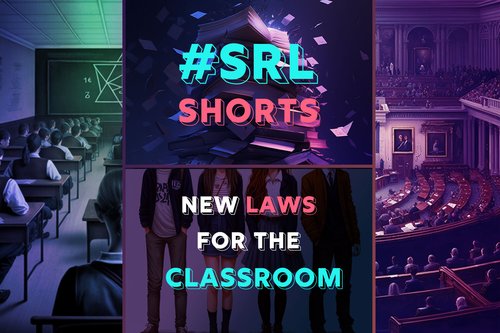
Schools have become flashpoints for America’s political debates– with teachers and students caught in the middle. Lawmakers have proposed more than 200 bills that would restrict or change the way teachers talk about race, American history, gender and sexuality, limit students’ access to books, or increase parents’ rights over their children’s education. According to the Washington Post, 64 of these bills have been signed into law across 25 states.
More than 1,600 books have been banned from schools, according to the free speech advocacy organization PEN America.
SRL wants to hear your experiences and opinions about what you learn and read at school.
YOUR ASSIGNMENT: Students will create short, vertical videos (10-30 seconds). They can film either themselves or interview fellow peers. As well as research and explain some laws!
We aim to publish the responses on our TikTok and Instagram!
This will be a recurring monthly challenge in which students will submit rapid response type answers to questions. The theme changes monthly for #SRLShorts.
We PRIMARILY are accepting videos in a VERTICAL format for social media. You can include horizontal but please film with enough space around your subject to allow for vertical cropping.
Please do not add music or text to your videos! :)
Note: Please only send it your top 5 responses per class. Also, when answering, please include the question in your response. Example: What is your favorite color? My favorite color is blue.
Failure to do so can result in your video not being used in the final product.
Using yourself on camera, describe the changes and how you feel. Are you in favor of these changes or against them?
You can interview fellow teens and ask them to explain how they feel about these changes and how the education system should serve students.
Choose a proposed bill, new law or policy, and discuss what you think are the benefits or drawbacks. Include whether you believe, as a student, that this is something that would help you in your learning.
For example:
These are the Social Media Guidelines
To Research Bills For Option 3:
Pending Civic Education Bills in states
School Lesson Plans (Missouri)
Idaho Governor Signs Bill To Ban Critical Race Theory In Schools
FAQ: Oklahoma’s so-called critical race theory ban
Journalism is the activity of gathering, assessing, creating, and presenting news and information.
Belief that someone or something is reliable, good, honest, effective, etc.
Prejudice in favor of or against one thing, person, or group compared with another, usually in a way considered to be unfair.
Media refers to all electronic or digital means and print or artistic visuals used to transmit messages.
The condition of having or being composed of differing elements. Especially in the context of the inclusion of people of different races, cultures, etc. in a group or organization
The act or practice of including and accommodating people who have historically been excluded (as because of their race, gender, sexuality, or ability)
Immediate, current information and events are newsworthy because they have just recently occurred. It’s news because it’s “new.”
People are attracted to information that helps them make good decisions. If you like music, you find musician interviews relevant. If you’re looking for a job, the business news is relevant. We need to depend on relevant information that helps us make decisions.
When violence strikes or when people argue about actions, events, ideas or policies, we care. Conflict and controversy attract our attention by highlighting problems or differences within the community or between groups. Sometimes conflict can be subtle and manifest as tension.
The term “empathy” is used to describe a wide range of experiences. A generally definition is the ability to sense other people’s emotions, coupled with the ability to imagine what someone else might be thinking or feeling. In media-making, creators can have empathy for their subjects and the audience can empathize with the characters.
Construct an explanation based on evidence for how the availability of natural resources, occurrence of natural hazards, and changes in climate have influenced human activity. (NGSS HS-ESS3-1)
Historical understanding requires recognizing this multiplicity of points of view in the past, which makes it important to seek out a range of sources on any historical question rather than simply use those that are easiest to find. It also requires recognizing that perspectives change over time, so that historical understanding requires developing a sense of empathy with people in the past whose perspectives might be very different from those of today. (NCSS D2.His.4.9-12 - D2.His.8.9-12)
Journalism
Representation
Race and Justice
Education
Social Media
Active Prompts
Beginner
Camera or Mobile Phone
Mobile Phone
30-60 minutes